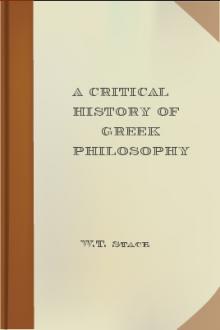A Critical History of Greek Philosophy by W. T. Stace (the false prince series .txt) 📕

- Author: W. T. Stace
- Performer: -
Book online «A Critical History of Greek Philosophy by W. T. Stace (the false prince series .txt) 📕». Author W. T. Stace
{20}
CHAPTER II
THE IONICS.
The earliest Greek philosophers belong to what in after times came to be called the Ionic school. The name was derived from the fact that the three chief representatives of this school, Thales, Anaximander, and Anaximenes, were all men of Ionia, that is to say, the coast of Asia Minor.
Thales
As the founder of the earliest school in history, Thales of Miletus is generally accounted the founder and father of all philosophy. He was born about 624 B.C. and died about 550 B.C. These dates are approximate, and it should be understood that the same thing is true of nearly all the dates of the early philosophers. Different scholars vary, sometimes as much as ten years, in the dates they give. We shall not enter into these questions at all, because they are of no importance. And throughout these lectures it should be understood that the dates given are approximate.
Thales, at any rate, was a contemporary of Solon and Croesus. He was famous in antiquity for his mathematical and astronomical learning, and also for his practical sagacity and wisdom. He is included in {21} all the accounts of the Seven Sages. The story of the Seven Sages is unhistorical, but the fact that the lists of their names differ considerably as given by different writers, whereas the name of Thales appears in all, shows with what veneration he was anciently regarded. An eclipse of the sun occurred in 585 B.C., and Thales is alleged to have predicted it, which was a feat for the astronomy of those times. And he must have been a great engineer, for he caused a diversion of the river Halys, when Croesus and his army were unable to cross it. Nothing else is known of his life, though there were many apocryphal stories.
No writings by Thales were extant even in the time of Aristotle, and it is believed that he wrote nothing. His philosophy, if we can call it by that name, consisted, so far as we know, of two propositions. Firstly, that the principle of all things is water, that all comes from water, and to water all returns. And secondly, that the earth is a flat disc which floats upon water. The first, which is the chief proposition, means that water is the one primal kind of existence and that everything else in the universe is merely a modification of water. Two questions will naturally occur to us. Why did Thales choose water as the first principle? And by what process does water, in his opinion, come to be changed into other things; how was the universe formed out of water? We cannot answer either of these questions with certainty. Aristotle says that Thales "probably derived his opinion from observing that the nutriment of all things is moist, and that even actual heat is generated therefrom, and that animal life is sustained by water, ... and from the fact that the seeds of all things possess {22} a moist nature, and that water is a first principle of all things that are humid." This is very likely the true explanation. But it will be noted that even Aristotle uses the word "probably," and so gives his statement merely as a conjecture. How, in the opinion of Thales, the universe arose out of water, is even more uncertain. Most likely he never asked himself the question, and gave no explanation. At any rate nothing is known on the point.
This being the sum and substance of the teaching of Thales, we may naturally ask why, on account of such a crude and undeveloped idea, he should be given the title of the father of philosophy. Why should philosophy be said to begin here in particular? Now, the significance of Thales is not that his water-philosophy has any value in itself, but that this was the first recorded attempt to explain the universe on naturalistic and scientific principles, without the aid of myths and anthropomorphic gods. Moreover, Thales propounded the problem, and determined the direction and character, of all pre-Socratic philosophy. The fundamental thought of that period was, that under the multiplicity of the world there must be a single ultimate principle. The problem of all philosophers from Thales to Anaxagoras was, what is the nature of that first principle from which all things have issued? Their systems are all attempts to answer this question, and may be classified according to their different replies. Thus Thales asserted that the ultimate reality is water, Anaximander indefinite matter, Anaximenes air, the Pythagoreans number, the Eleatics Being, Heracleitus fire, Empedocles the four elements, Democritus atoms, and so on. The first period is thus {23} essentially cosmological in character, and it was Thales who determined the character. His importance is that he was the first to propound the question, not that he gave any rational reply to it.
We saw in the first chapter, that man is naturally a materialist, and that philosophy is the movement from sensuous to non-sensuous thought. As we should expect, then, philosophy begins in materialism. The first answer to the question, what the ultimate reality is, places the nature of that reality in a sensuous object, water. The other members of the Ionic school, Anaximander, and Anaximenes, are also materialists. And from their time onwards we can trace the gradual rise of thought, with occasional breaks and relapses, from this sensualism of the Ionics, through the semi-sensuous idealism of the Eleatics, to the highest point of pure non-sensuous thought, the idealism of Plato and Aristotle. It is important to keep in mind, then, that the history of philosophy is not a mere chaotic hotch-potch of opinions and theories, succeeding each other without connection or order. It is a logical and historical evolution, each step in which is determined by the last, and advances beyond the last towards a definite goal. The goal, of course, is visible to us, but was not visible to the early thinkers themselves.
Since man begins by looking outwards upon the external world and not inwards upon his own self, this fact too determines the character of the first period of Greek philosophy. It concerns itself solely with nature, with the external world, and only with man as a part of nature. It demands an explanation of nature. And this is the same as saying that it is cosmological. The {24} problems of man, of life, of human destiny, of ethics, are treated by it scantily, or not at all. It is not till the time of the Sophists that the Greek spirit turns inwards upon itself and begins to consider these problems, and with the emergence of that point of view we have passed from the first to the second period of Greek philosophy.
Because the Ionic philosophers were all materialists they are also sometimes called Hylicists, from the Greek hulé which means matter.
Anaximander
The next philosopher of the Ionic school is Anaximander. He was an exceedingly original and audacious thinker. He was probably born about 611 B.C. and died about 547. He was an inhabitant of Miletus, and is said to have been a disciple of Thales. It will be seen, thus, that he was a younger contemporary of Thales. He was born at the time that Thales was flourishing, and was about a generation younger. He was the first Greek to write a philosophic treatise, which however has been unfortunately lost. He was eminent for his astronomical and geographical knowledge, and in this connection was the first to construct a map. Details of his life are not known.
Now Thales had made the ultimate principle of the universe, water. Anaximander agrees with Thales that the ultimate principle of things is material, but he does not name it water, does not in fact believe that it is any particular kind of matter. It is rather a formless, indefinite, and absolutely featureless matter in general. {25} Matter, as we know it, is always some particular kind of matter. It must be iron, brass, water, air, or other such. The difference between the different kinds of matter is qualitative, that is to say, we know that air is air because it has the qualities of air and differs from iron because iron has the qualities of iron, and so on. The primeval matter of Anaximander is just matter not yet sundered into the different kinds of matter. It is therefore formless and characterless. And as it is thus indeterminate in quality, so it is illimitable in quantity. Anaximander believed that this matter stretches out to infinity through space. The reason he gave for this opinion was, that if there were a limited amount of matter it would long ago have been used up in the creation and destruction of the "innumerable worlds." Hence he called it "the boundless." In regard to these "innumerable worlds," the traditional opinion about Anaximander was that he believed these worlds to succeed each other in time, and that first a world was created, developed, and was destroyed, then another world arose, was developed and destroyed, and that this periodic revolution of worlds went on for ever. Professor Burnet, however, is of opinion that the "innumerable worlds" of Anaximander were not necessarily successive but rather simultaneously existing worlds. According to this view there may be any number of worlds existing at the same time. But, even so, it is still true that these worlds were not everlasting, but began, developed and decayed, giving place in due time to other worlds.
How, now, have these various worlds been formed out of the formless, indefinite, indeterminate matter of {26} Anaximander? On this question Anaximander is vague and has nothing very definite to put forward. Indeterminate matter by a vaguely conceived process separates itself into "the hot" and "the cold." The cold is moist or damp. This cold and moist matter becomes the earth, in the centre of the universe. The hot matter collects into a sphere of fire surrounding the earth. The earth in the centre was originally fluid. The heat of the surrounding sphere caused the waters of the earth progressively to evaporate giving rise to the envelope of air which surrounds the earth. For the early Greeks regarded the air and vapour as the same thing. As this air or vapour expanded under the action of heat it burst the outside hot sphere of fire into a series of enormous "wheel-shaped husks," resembling cart wheels, which encircle the earth. You may naturally ask how it is that if these are composed of fire we do not see them continually glowing. Anaximander's answer was that these wheel-shaped husks are encrusted with thick, opaque vapour, which conceals the inner fire from our view. But there are apertures, or pipe-like holes in the vapour-crust, and through these the fire gleams, causing the appearance of the sun, stars, and moon. You will note that the moon was, on this theory, considered to be fiery, and not, as we now know it to be, a cold surface reflecting the sun's light. There were three of these "cart wheels"; the first was that of the sun, furthest away from the earth, nearer to us was that of the moon, and closest of all was that of the fixed stars. The "wheel-shaped husks" containing the heavenly bodies are revolved round the earth by means of currents of air. The earth in the centre was believed by {27} Anaximander to be not spherical but cylindrical. Men





Comments (0)